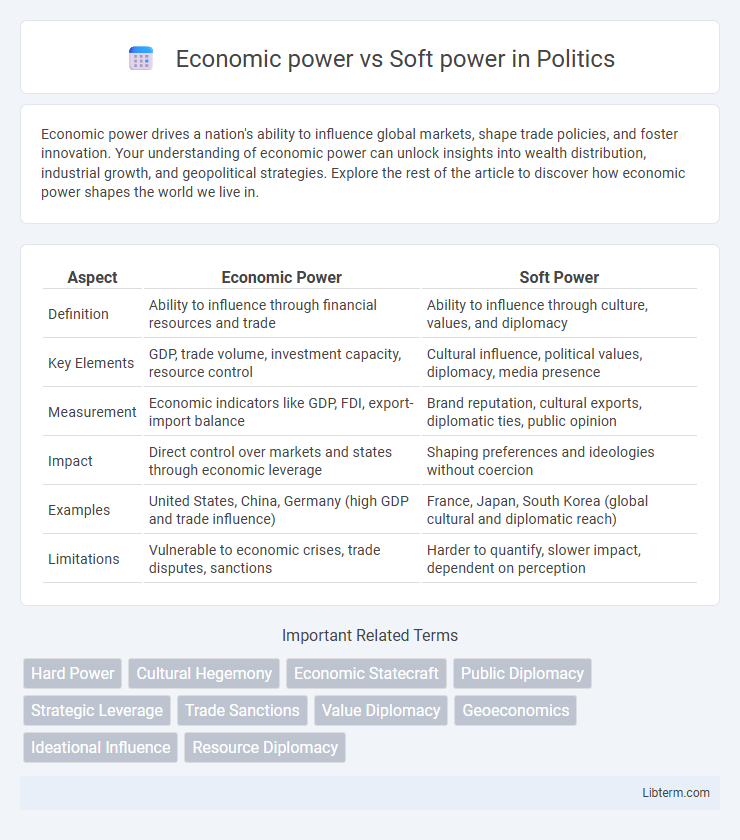Economic power drives a nation's ability to influence global markets, shape trade policies, and foster innovation. Your understanding of economic power can unlock insights into wealth distribution, industrial growth, and geopolitical strategies. Explore the rest of the article to discover how economic power shapes the world we live in.
Table of Comparison
| Aspect | Economic Power | Soft Power |
|---|---|---|
| Definition | Ability to influence through financial resources and trade | Ability to influence through culture, values, and diplomacy |
| Key Elements | GDP, trade volume, investment capacity, resource control | Cultural influence, political values, diplomacy, media presence |
| Measurement | Economic indicators like GDP, FDI, export-import balance | Brand reputation, cultural exports, diplomatic ties, public opinion |
| Impact | Direct control over markets and states through economic leverage | Shaping preferences and ideologies without coercion |
| Examples | United States, China, Germany (high GDP and trade influence) | France, Japan, South Korea (global cultural and diplomatic reach) |
| Limitations | Vulnerable to economic crises, trade disputes, sanctions | Harder to quantify, slower impact, dependent on perception |
Defining Economic Power and Soft Power
Economic power refers to a nation's ability to influence global markets, trade, and financial systems through its wealth, industrial capacity, and economic resources. Soft power is the capacity to shape the preferences and values of other countries through cultural appeal, political ideals, diplomacy, and media influence without coercion. Both forms of power are essential in international relations, with economic power providing tangible leverage while soft power fosters voluntary alignment and cooperation.
Historical Evolution of Power Dynamics
Economic power historically served as the dominant force in shaping global influence through trade, industrial capacity, and resource control since the Industrial Revolution. Soft power emerged prominently in the 20th century, especially post-World War II, as cultural diplomacy, political values, and international institutions became crucial in shaping alliances and global governance. The interplay between economic power and soft power intensified during the Cold War, exemplifying how nations leveraged both economic strength and ideological appeal to assert influence on the world stage.
Key Drivers of Economic Power
Economic power is primarily driven by factors such as gross domestic product (GDP), industrial capacity, technological innovation, and capital accumulation. Control over natural resources, a skilled labor force, and access to international markets further amplify a nation's economic influence. Investment in infrastructure, research and development, and financial systems enhances productivity and competitiveness on the global stage.
The Role of Culture in Soft Power
Cultural influence plays a pivotal role in soft power by shaping global perceptions and fostering international goodwill, often surpassing the direct impact of economic strength. Nations with rich cultural exports, such as film, music, art, and language, cultivate attractive national identities that enhance diplomatic relations and encourage cooperation. This cultural capital fuels soft power by creating emotional connections that promote values and ideologies, making it a crucial component alongside economic power in global influence strategies.
Economic Power: Global Influence Through Trade and Investment
Economic power shapes global influence through extensive trade networks and strategic investment flows that drive national growth and international leverage. Nations wield economic power by controlling critical resources, capital markets, and technological innovation, which bolster their ability to set global standards and negotiate favorable agreements. This form of influence directly impacts global supply chains, employment rates, and geopolitical stability, reinforcing the connection between economic strength and international leadership.
Diplomacy and the Mechanics of Soft Power
Economic power leverages financial resources, trade influence, and investment capacity to shape international relations, while soft power relies on cultural appeal, political values, and diplomacy to attract and persuade other nations. Diplomacy, as a core mechanism of soft power, involves strategic communication, cultural exchange programs, and international institutions to build trust and cooperation without coercion. Effective soft power diplomacy enhances a country's global image, facilitates alliances, and complements economic strategies by fostering long-term influence rooted in attraction rather than force.
Comparing the Effectiveness of Economic and Soft Power
Economic power drives influence through financial assets, trade control, and investment capacity, directly shaping global markets and political decisions. Soft power leverages cultural appeal, diplomatic relationships, and ideological attractiveness to persuade without coercion, often producing longer-lasting alignment and cooperation. While economic power yields immediate leverage, soft power fosters sustainable goodwill that can underpin enduring international partnerships.
Case Studies: Nations Excelling in Economic vs. Soft Power
China exemplifies economic power through its vast manufacturing base and Belt and Road Initiative, significantly influencing global trade and infrastructure development. Conversely, Sweden excels in soft power with its strong emphasis on human rights, innovation, and cultural exports like music and design, shaping international perceptions positively. The United States uniquely combines both, leveraging economic dominance alongside Hollywood, education, and diplomacy to maintain global influence.
Challenges and Limitations of Each Power Type
Economic power faces challenges such as dependence on global markets, vulnerability to economic sanctions, and the risk of provoking trade wars that can undermine growth. Soft power struggles with limitations in measuring influence, cultural resistance, and the slow pace of changing foreign public opinions. Both power types require strategic blending to maximize effectiveness in international relations.
The Future Balance of Economic and Soft Power in International Relations
The future balance of economic and soft power in international relations will increasingly depend on technological innovation, digital infrastructure, and cultural influence. Economic power, driven by trade dominance and financial markets, remains essential for state leverage, while soft power--rooted in diplomacy, education, and global media--shapes long-term international cooperation and public perception. Nations combining robust economic growth with effective soft power strategies are poised to lead global governance and influence geopolitical stability.
Economic power Infographic

 libterm.com
libterm.com